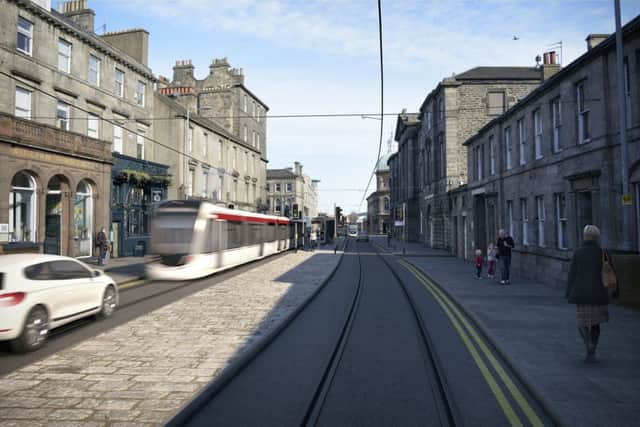Edinburgh tram extension labelled ‘price hike bombshell’ as cost soars by £42 million
and live on Freeview channel 276
Tory opponents say that the increased budget and an extra £50m of insurance from reserves means taxpayers are being asked to set aside £92m per mile – labelling it a “price hike bombshell”.


City councillors got their first chance to examine the confidential final business case on Friday in a “special data room” at City Chambers – before the full council decides whether or not to approve the extension on March 14.
Advertisement
Hide AdAdvertisement
Hide AdIf the extension is approved, the works should be completed by 2022 and operational in the first quarter of 2023.
In the first year of operation, the council predicts doubling estimated future passenger numbers to 16 million.
An initial assessment of the extension was predicted to cost a total of £165m – which has now increased by £42m.
The council says the extension can be built within a budget of £196m, but members will be asked to approve an overall budget of £207.3m to include a recommended 6 per cent level of “optimism bias” to take account of any problems encountered – as well as £50m of reserves.
Advertisement
Hide AdAdvertisement
Hide AdCouncil leader Cllr Adam McVey said: “The final business case before us now is the result of a huge amount of work by the project team to produce a strong business case for taking trams to Newhaven which – crucially – does not divert funding from other council services.
“Having developed the case further and gone through the tender process, we now have much greater certainty of the total project cost – following industry guidance, learning the lessons from the previous project and taking a thorough, diligent and prudent approach to risk management. We will work to make sure the timelines and costs in the final business case are met.
“All councillors will be taking the opportunity to examine in detail the final business case and associated documents in detail so that we can collectively make as informed a decision as possible come March 14. If the council moves ahead with this project, we’ll be working hard to make sure we deliver this project on time, on budget.”
The delayed original tram line was opened in 2014 and cost £776m for a shortened route – more than double the original budget. The estimated final costs of the inquiry into the crisis is expected to rise above £10m.
Advertisement
Hide AdAdvertisement
Hide AdThe project will be funded through borrowing, paid back by future tram fare revenues, along with a special £20m dividend from Lothian Buses.
On the first day of the data room opening to councillors, Labour, SNP, Green and Lib Dem members visited the information stock – but no Tory councillors took an early look at the details.
As well as the council taking more risk into account following the problems with the first phase of the tram project, market pressures led by the downfall of construction company Carillion have added to the rising construction costs – along with contractors being brought in from the start of the process.
Conservative transport spokesman, Cllr Nick Cook, said: “This tram extension price hike bombshell again proves the council is incapable of keeping a project of this scale on track. The Labour/SNP administration may attempt to casually explain away this latest price hike, but taxpayers will be appalled that they are willing to green-light this £92m per mile project, against a backdrop of tens of millions of pounds worth of cuts to the council’s budget.”
Advertisement
Hide AdAdvertisement
Hide AdHe added: “Budgetary pressures, coupled with years of delayed decisions, spiralling costs and casual disregard for the ongoing tram inquiry into the original project should raise alarm bells with councillors across the political divide.
“I urge colleagues of all parties in the city chambers to now reconsider their support for this extension, which is a fundamentally flawed use of taxpayers cash.”
Following the problem-hit first phase of the tram project, construction is planned using a “one-dig” approach – closing each work site only once and opening them again only when all works are complete.
